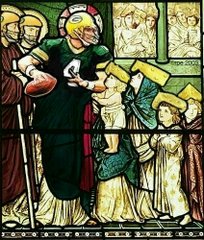Today we will look at the parable of the "steward of unrighteousness" in our Gospel lesson in light of Luke 9:51-56:
Now it came to pass, when the time had come for Him to be received up, that He steadfastly set His face to go to Jerusalem,
 and sent messengers before His face. And as they went, they entered a village of the Samaritans, to prepare for Him. But they did not receive Him, because His face was set for the journey to Jerusalem. And when His disciples James and John saw this, they said, "Lord, do You want us to command fire to come down from heaven and consume them, just as Elijah did?" But He turned and rebuked them, and said, "You do not know what manner of spirit you are of. "For the Son of Man did not come to destroy men's lives but to save them." (Luke 9:51-56, NKJ)
and sent messengers before His face. And as they went, they entered a village of the Samaritans, to prepare for Him. But they did not receive Him, because His face was set for the journey to Jerusalem. And when His disciples James and John saw this, they said, "Lord, do You want us to command fire to come down from heaven and consume them, just as Elijah did?" But He turned and rebuked them, and said, "You do not know what manner of spirit you are of. "For the Son of Man did not come to destroy men's lives but to save them." (Luke 9:51-56, NKJ) But you are not willing to come to Me that you may have life. (John 5:39-40 NKJ)
But you are not willing to come to Me that you may have life. (John 5:39-40 NKJ)1. Nowhere in the parable does the accusation become a fact born out by evidence.
2. The person or persons doing the accusing are never revealed.
 and the Pharisees were tools of the devil and Christ’s accusers. Keep this thought in mind, we will come back to it shortly.
and the Pharisees were tools of the devil and Christ’s accusers. Keep this thought in mind, we will come back to it shortly.But now, let us take a quick look at how Jesus closes the parable: "So the master commended the unjust steward because he had dealt shrewdly.
Here the Greek word so often translated "shrewdly" is perhaps better understood as "prudently" or even "wisely."
What was so prudent and wise about the stewards actions toward the debtors? It could only be the forgiving of their debts. Here is the nugget of the story that prepares the disciples for what is to come -- that journey to Jerusalem to which Jesus had steadfastly set His face that He might be received up on the cross to forgive the debts of a sinful world that owes the Master, the Lord God, their very lives. It is the same nugget that leaves the Pharisees shaking their heads and leads to their being the agents for Christ’s death.
These Pharisees were continually trying to trap Jesus, accusing Him of sinning against the Scriptures and blaspheming God and His name. Eventually they succeeded in making their accusations stick – at least in the realm of this unrighteous world. The result was that the only righteous one among us was slain on a cursed tree to bear the unrighteousness of those He came to serve. Jesus, the very Son of God who knew no sin and was falsely accused, became sin for us so that He could pay the price and wipe out all our debt before His Father, the rich man and Lord of Heaven to whom we all owe our very lives and all that we have.
On the cross Jesus the Christ, the steward of unrighteousness, that is, the one who managed our sin and bore its consequences for us, begged His Father, the master of the estate, "Father forgive them, for they know not what they do."

In a great reversal Jesus, the steward of our unrighteousness, makes us stewards of His righteousness. What a great Gospel lesson and parable on this day that we will be holding a Voters’ Assembly largely to address our own stewardship issues.
So often we look at stewardship as what we do with our money, our stuff, our time, our skills. Thus the meetings become forums to ask, "Where will we get the money?" "How are we going to get more people into our church to help us make the budget?" "How can we spend less to preserve our resources?"
Dear brothers and sisters in Christ, these are the wrong questions to ask! Just as the steward of unrighteousness has nothing that has not been given first by the master, that is, the Father in heaven, we have nothing that truly belongs to us that has not been given us by God to manage for the sake of our neighbor – i.e. parents, spouse, children, relatives, friends, co-workers, fellow church members, and the people in the communities in which we live.
Stewardship is not a matter of our raising funds, our luring more people into the pews, or how frugal we can be with our resources. As another of Jesus’ parables, the parable of the talents shows, stewardship is about taking all that has been given and entrusted to us – some more, some less – and using it for the sake of others without fear of running out or worry about what we will return to the Lord. For the One who has given us all things has all thing to give and has promised to supply us with whatever we need for this life and the next.
So we should never think of stewardship as what we sacrifice for God. For, other than our own sin, we have nothing to give – whether treasures of this world or the kingdom of heaven – that has not first been given to us.
This is what Jesus has in mind when He exhorts us to, "... go and learn what this means: ‘I desire mercy and not sacrifice.’ For I did not come to call the righteous, but sinners to repentance." Matthew 9:13
All of us baptized children of God are, first of all, His stewards of righteousness. In God’s mercy we have been given the keys to the kingdom of heaven, and are sent out to bring more people into the kingdom and house of our Lord. We are first of all stewards of the means of grace, the Word and the Sacraments, for the forgiveness of sins that bestows the mercy of God on all who hear and believe. Then, second of all, we are stewards of unrighteous mammon, the riches of this world by which we are given to ensure the means of grace have a home, a person to administer them, and the means to take them out into the world.
That we may be faithful stewards and set our faces to the cross with Jesus, the disciples, the prophets, and all the saints, our Lord catechizes us to be disciples as well.
We pray in The Fifth Petition of the Lord’s Prayer as taken from Matthew 6:12: And forgive us our debts, as we forgive our debtors. What does this mean? We pray in this petition that our Father in heaven would not look at our sins, or deny our prayer because of them. We are neither worthy of the things for which we pray, nor have we deserved them, but we ask that he would give them all to us by grace, for we daily sin much and surely deserve nothing but punishment. So we too will sincerely forgive and gladly do good to those who sin against us.
And that because we have been forgiven first – for he sake of the steward of our unrighteous sin and debt, Jesus the Christ our Savior and Lord, who has given us the name we bear upon ourselves and into the world ...
the name of the Father, and of the Son, and of the Holy Spirit. Amen





